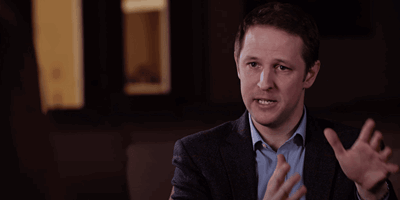Robert told me he had attended a funeral recently, and while he was there he felt disrespected by the Christians. When I asked why, he told me he was made to feel that he was just a target for the gospel, just a soul who needed to be saved.
We chatted for a while about how his offence sprang from the fact he doesn’t believe what Christians believe. I asked him, “Can you not see that if you believed what Christians believe then you would view everyone as a soul who needs to be saved?” He said, “But I don’t believe what Christians believe!”
“I know,” I replied, “but they do! They believe your existence doesn’t end at the grave.” I told him about the famous atheist magician, Penn Jillette, who said, “I’ve always said that I don’t respect people who don’t proselytize. … How much do you have to hate somebody to believe that everlasting life is possible and not tell them that?”
But after talking about this for a while, I told him I wanted to deal with the issue of respect generally, rather than the specifics of his experience.
“I am a Christian,” I said. “So, I believe you are created in the image of God, and because of that you have dignity, intrinsic value, infinite worth, and it is wrong for anyone to treat you in a disrespectful way. You believe we are bags of mostly water, nothing but a collection of chemicals, the end product of a mindless process. On your view we are star dust, descendants of fish, cousins of bacteria, fruit flies and bananas. How do you get from there to ‘Therefore I deserve respect?’ I’m missing a few steps in the argument.”
"I believe you are created in the image of God, and because of that you have dignity, intrinsic value, infinite worth, and it is wrong for anyone to treat you in a disrespectful way."
He admitted he couldn’t fill in the blanks, because as an atheist he didn’t believe in good and evil! He said that good and evil requires the universe has a purpose.
He was absolutely right. Most atheists don’t see this. They think atheism gets rid of God but allows them to keep the categories of good and evil. In fact, if you get rid of God you get rid of good too, which means there’s no evil either.
Robert agreed with this in theory, but the problem is he disagreed with it in practice. Throughout our conversation he continually made moral judgments, condemning Christians and God for all sorts of things. When I reminded him that on his view there is no evil, he would say, “I know there’s no evil, but in my opinion that’s evil.” I told him that this qualification made no sense – it is his opinion that there is no evil. It is like saying, “I don’t believe in the Loch Ness monster, but in my opinion he’s green,” or saying, “There’s no east or west in space, but in my opinion east is this way.”
"Truth corresponds to reality."
Truth corresponds to reality. Robert cannot live consistently with his beliefs. The reason is, they don’t match up with reality. That means they aren’t true. His outrage at being disrespected proves he knows there’s more to him than meets the eye. He is made in the image of God. His words deny it, but his actions affirm it all the time.

































